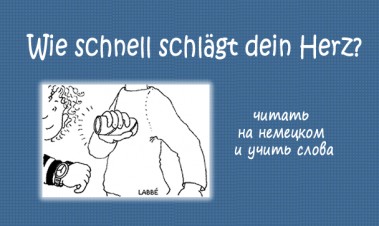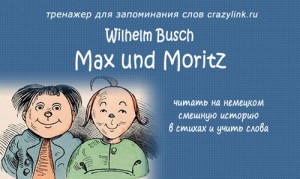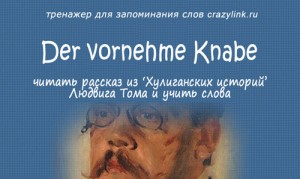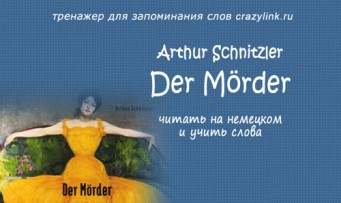- Вы тут:немецкий
- книги и рассказы
Книги и рассказы на немецком
Мы собрали самые интересные книги и рассказы на немецком специально для тебя! Выучи слова на нашем тренажере и читай на немецком без словаря!
Как это работает? Очень просто!
1. Перед тем как читать на немецком ознакомься со всеми словами, которые ты видишь в тренажере, пролистай их несколько раз, прочитай комментарии.
2. Нажимай на кнопку «начать учить слова» и выполняй задания. Не волнуйся, если сразу не получается — слова повторяются до тех пор, пока не запомнишь!
3. Прочитай текст и постарайся понять смысл. Должно получиться. Удачи!
Более подробная инструкция тут
выбрать уровень:
легкий,
средний,
сложный
Фильтры:
-
Полезная лексика и интересная информация в заметке Wie schnell schlägt dein Herz?
уровень: для начинающих,
успешно прошли урок: 1431 человек(а)
начать урок
-
Летняя неприятность — солнечные ожоги. Sonnenbrand
уровень: средний,
успешно прошли урок: 736 человек(а)
начать урок
-
Рецепт пряничных человечков на немецком. Lebkuchenmänner #neujahr
уровень: средний,
успешно прошли урок: 430 человек(а)
начать урок
-
-
-
История про жадность. Заяц и Лиса
уровень: средний,
успешно прошли урок: 367 человек(а)
начать урок
-
Der Goldbaum. История о том, как нехорошо издеваться над младшими братьями и сестрами ))
уровень: средний,
успешно прошли урок: 364 человек(а)
начать урок
-
- Главная
- Тексты
-
Учебные
тексты на немецком
Учебные тексты для начального уровня на
немецком с упражнениями
Не уверен в своих
силах? читать
Какие тексты читать начинающим?
Находитесь в начале пути? Или возвращаетесь
после
перерыва?
С нашими учебными текстами и
упражнениями вы легко привыкнете к немецкому языку и сможете
выучить
необходимые немецкие слова и выражения и научиться
писать
по-немецки несложные, но очень полезные предложения.
Удачи в изучении немецкого
языка!
- Показано 20 из 145
Тема:
По темам
- Интернет и масс-медиа
- Спорт и туризм
- Транспорт
- Кино и ТВ
- Образ жизни и общение
- Хобби, досуг, отдых
- Биографии
- Искусство и культура
- Образование
- Город, здания, улица
- Традиции и религии
- Семья, дети, отношения
- животные
- Время и календарь
- Дом, еда, покупки
- Работа и профессии
- Природа и климат
- Растения и животные
- Страны и народы
- Медицина и здоровье
- Происшествия
- Показано 20 из 145
Рассказы
Сказка братьев Гримм «Загадка»

Es war einmal ein Königssohn, der bekam Lust, in der Welt umherzuziehen, und nahm niemand mit als einen treuen Diener. Eines Tags geriet er in einen großen Wald, und als der Abend kam, konnte er keine Herberge finden und wußte …
Читать далее »
Гадкий утенок — Das hässliche junge Entlein

Es war so herrlich draußen auf dem Lande. Der Sommer war da! Das Korn stand gelb, der Hafer grün, das Heu war unten auf den grünen Wiesen in Schobern aufgesetzt, und der Storch ging auf seinen langen, roten Beinen umher. …
Читать далее »
Братья Гримм: Счастливый Ганс — Hans im Glück

Hans hatte sieben Jahre bei seinem Herrn gedient, da sprach er zu ihm ‘Herr, meine Zeit ist herum, nun wollte ich gerne wieder heim zu meiner Mutter, gebt mir meinen Lohn.’ Der Herr antwortete ‘du hast mir treu und ehrlich …
Читать далее »
Рассказ: Der Springer — Hans Christian Andersen

Der Floh, der Grashüpfer und die Springgans wollten einmal sehen, wer von ihnen am höchsten springen konnte, und deshalb luden sie alle Welt und wer sonst noch kommen wollte, ein, um der Pracht zuzuschauen. Es waren drei ordentliche Springer, die …
Читать далее »
Hänsel und Gretel — Ein Märchen der Brüder Grimm

Vor einem großen Walde wohnte ein armer Holzhacker mit seiner Frau und seinen zwei Kindern; das Bübchen hieß Hänsel und das Mädchen Gretel. Er hatte wenig zu beißen und zu brechen, und einmal, als große Teuerung ins Land kam, konnte …
Читать далее »
Сказка «Der Hase und der Igel» der Brüder Grimm

Diese Geschichte hört sich ziemlich lügenhaft an, Jungens, aber wahr ist sie doch, denn mein Großvater, von dem ich sie habe, pflegte immer, wenn er sie behaglich erzählte, dabei zu sagen:»Wahr muß sie doch sein, mein Sohn, anders könnte man …
Читать далее »
Рассказ: Солнечный ожог — Sonnenbrand

Jedes Jahr freue ich mich auf den ersten Tag im Freibad, aber nicht auf den Sonnenbrand. Darum benutze ich immer eine gute Sonnenmilch und renne auch nicht den ganzen Tag in der prallen Sonne herum. Das Blöde am Sonnenbrand ist, …
Читать далее »
Рассказ «Снеговик — Der Schneemann» с переводом

Es hatte geschneit. Dick lag der Schnee auf Straßen und Plätzen. Die Knaben wollten sehen, wie tief er wohl sei (насколько глубоко). Sie wateten hindurch, dass der Schnee in die Stiefel fiel. «Heute wollen wir einen Schneemann bauen!» So riefen …
Читать далее »
Поучительная история: DER GOLDBAUM

Eduard scherzte gerne und spielte auch gerne anderen einen Streich. Seine kleine Schwester Emilie, die noch nicht in die Schule ging, fragte gerne ihren Bruder, den sie für sehr weise hielt (которого она считала очень умным), über alles aus. Um …
Читать далее »
Сказка: DER HASE UND DER FUCHS

Ein Hase und ein Fuchs machten im Winter eine Reise. Alles war mit Schnee bedeckt. Der Hunger plagte sie sehr. Da sahen sie ein Mädchen mit einem Korbe kommen, darin (внутри) war Brot. Das merkte der Fuchs und sagte zu dem …
Читать далее »

By
Last updated:
January 4, 2023
German short stories make fantastic material for listening, speaking and writing practice.
Plus, they can expand your awareness of the world and of German culture.
We’ll take you through our list of 10 easy German short stories, the benefits of reading them, as well as tips and where to find them so you can start reading today!
Contents
- 1. “Das Märchen” (The Fairy Tale)
- 2. “Die Geschichte von Hyazinth und Rosenblütchen” (The Story of Hyacinth and Roseblossom)
- 3. “Die Bremer Stadtmusikanten” (The Bremen Town Musicians)
- 4.“Anekdote zur Senkung der Arbeitsmoral” (Anecdote on Lowering Work Ethic)
- 5. “Skorpion” (Scorpion)
- 6. “Learn German with Stories: Café in Berlin”
- 7. “Die Küchenuhr“ (The Kitchen Clock)
- 8. “Auf Der Flucht“ (On the Run)
- 9. “Aus Eines Taugenichts” (The Broommaker of Rychiswyl)
- 10. “Das Bettelweib von Locarno” (The Beggar Woman of Locarno)
- Benefits of Learning German with Easy Short Stories
- Bonus: Tips for Using Short Stories to Boost Your Learning
- Where to Find Easy German Short Stories Online
Download:
This blog post is available as a convenient and portable PDF that you
can take anywhere.
Click here to get a copy. (Download)
It is hard to choose stories in a language with such a rich literary tradition.
The choices I made here involved a balance between literary quality, simplicity and straightforwardness of language, as well as the potential for grammar and vocabulary learning.
Choosing stories that are evocative and have a powerful message doesn’t hurt either, so I tried to add some of that into the mix as well.
1. “Das Märchen” (The Fairy Tale)
The story begins with a ferryman who sees ghosts but what appears to be a “ghost story” eventually turns into a tale of impossible love and the magic that succeeds in making it possible.
Read by some critics as a fictional representation of some of Schiller’s ideas about human freedom, the story was Goethe’s way of showing how a human soul can manage to become whole and free.
While this may sound almost too deep, the story’s language is simple and the conflicts it presents are straightforward. Vocabulary and grammar points include landscape descriptions, the Perfekt tense (present perfect) and verbs related to movement and position.
Goethe is one of the greatest writers in the language, so while you may not yet be able to enjoy some of his more complex works, this story is a perfect introduction to his literature.
An “Das Märchen” is available to help you with new and unknown vocabulary and this audio version can be a great tool for listening and pronunciation practice.
2. “Die Geschichte von Hyazinth und Rosenblütchen” (The Story of Hyacinth and Roseblossom)
This story is part of a larger work entitled “Die Lehrlinge zu Sais” (The Disciples of Sais).
It is about Hyacinth and Roseblossom who live happily and in love during childhood. This harmony is disturbed when an older man starts telling Hyacinth stories about foreign lands and wonderful things he has never seen before.
After this, Hyacinth starts suffering from the romantic illness of melancholy. After a journey of discovery, he realizes that the most wonderful thing he can aspire to has always been in front of his eyes, and he is finally happy.
A beautiful parable written in simple yet poetic language, the story is great learning material.
Possible grammar points to learn from this story include passive voice and indirect speech. In terms of vocabulary, it features very interesting visual descriptions and lots of useful words and phrases used to express feelings and emotions.
The simple harmony-trigger-chaos-journey-restoration structure can be a great starting point for writing your own stories and parables in the vein of the German romantics—among which Novalis is one of the most famous.
And, last but not least, it is a beautiful story that will warm your heart. If your curiosity is piqued and you are up for some listening practice here is an audio version.
3. “Die Bremer Stadtmusikanten” (The Bremen Town Musicians)
This story has been translated into 160 languages, and there is a reason for this. It is a poetic fantasy about a donkey, a dog, a cat and a rooster, who are no longer useful to their masters.
After realizing they may face a dreadful fate, they decide one by one to head down to the town of Bremen. They then decide to live as musicians in the town but some setbacks and unexpected events complicate these plans—ultimately leading them to wisdom and revelation.
The story is a great tool for learning simple conversational German, as it features a lot of dialogues and it is also good to learn how to structure paragraphs based on cause and effect using words like denn (because), als (as) and endlich (finally), among many others.
It is perfect for beginners because the language is simple enough that new vocabulary can be inferred from context even at the earlier stages of language competency.
The link from the title will take you to a side-by-side bilingual version of the story.
4.“Anekdote zur Senkung der Arbeitsmoral” (Anecdote on Lowering Work Ethic)
Heinrich Böll is one of the greatest German writers and one of the very few who won the Nobel prize for literature.
His story about a fisherman who converses with a tourist about work ethics was a response to a very specific context in German history. In the early 1960s, the German economy was booming and “The Happy Fisherman” served to question the work ethic associated with that economic bonanza.
Basically, the fisherman is telling the tourist that he has caught so many fish the day before that he can just sit in the sun all day long. The tourist tells him that he should go out every day so he can amass a fortune but the fisherman ends up teaching him a lesson.
The story is as simple as it is powerful. It is a great tool to practice the future tense and vocabulary to express expectations and predictions for the future.
Its simple structure can be a great prompt for a story writing exercise. Finally, the arguments of the person who appeared to bring wisdom are crushed by the observable reality of the first person’s life and circumstances.
An audio reading in the original German is also available.
5. “Skorpion” (Scorpion)
In German, male writers tend to get more press than female ones. Fortunately, the male domination of literature has not prevented the amazing Christa Reinig from reaching her audience.
Scorpion tells the story of a man who feels excluded from society because of the way he looks.
Over the course of the narrative, he tries to persuade several people to accept him in spite of his appearance while walking through a city. It is a lovely parable with a worthy moral—the kind of moral that can touch your heart.
Besides all its other good points, it is a great story to learn how to describe a face and oneself in interesting ways.
6. “Learn German with Stories: Café in Berlin”
To start, we have a collection of short stories that engages the reader and continues your learning with a series of shorts, one after another.
Each story follows a guy who comes to Berlin from Sicily, trying to figure out where he fits in and how he can get past the struggles of being in a new country.
We enjoy this story because it places you in the shoes of a Berlin newcomer, broadening your views on German culture and deepening your understanding of Germany’s capital city.
The book focuses on simple German sentences and basic vocabulary so you’ll rarely get lost or confused along the way. In addition, a German dictionary sits at the end of each story to cover the more difficult words and walk you through without any problems.
7. “Die Küchenuhr“ (The Kitchen Clock)
“Die Küchenuhr,” by Wolfgang Borchert, gives you a unique perspective on the German world since it’s extremely popular in Germany and many young school children are advised to read the story. (It’s similar to something like “Huckleberry Finn” in the United States.)
Seeing as how the Nazis dominated most of the conversation about Germans in World War II, it’s not often we stop to realize that millions of regular German people were victims as well.
This short story offers the perspective of a 20-year-old man who lost his home and family after he got bombed in a British air raid.
In the remains, he finds a kitchen clock, which reminds him of his mother and pushes him through this hard time. In terms of learning German, the sentences are simple and to the point and the story provides great practice in the German past tense.
8. “Auf Der Flucht“ (On the Run)
This short story was written by Wolfdietrich Schnurre, and it’s about a man and his family who are forced to abandon their homeland and flee through a barren landscape.
The dad leads the way but he questions his loyalty when he finds a loaf of bread since he’s been starving for so long.
It’s believed to have been written around 1945 and it presents an interesting look into the human condition and how people respond during desperate times.
The short sentences are wonderful for beginners and the vocabulary offers a solid look into some emotions and thoughts that may occur when you are sad or distraught.
It’s also worth pointing out that the story is written in the past tense and several short lines of dialogue are included for you to see how Germans interact with each other.
9. “Aus Eines Taugenichts” (The Broommaker of Rychiswyl)
“Aus dem Leben Enes Taugenichts” is written in somewhat of a parable format—the clear moral of the story on how money isn’t going to bring you happiness.
The story follows a younger boy who eventually grows old enough to start making his own money. A local farmer suggests that he start making brooms with some extra supplies on the farm so the boy learns about working hard, cherishing what is important and being responsible with his money.
Here’s the English version for you to jump back and see if you were able to read through the story without any problems.
You’ll notice in the translation that several themes are covered to strengthen your vocabulary. For example, mentions of God, the bible and other facets of religion are sprinkled throughout the text.
In addition, quite a few unique words expand your knowledge of the language, such as außerordentlich (exceptionally), Kornfelder (cornfields) and Kammerjungfer (maid).
10. “Das Bettelweib von Locarno” (The Beggar Woman of Locarno)
“Das Bettelweib von Locarno” is about a nobleman who housed a beggar woman in his estate. The woman eventually dies in the room from slipping and falling but people start reporting that the room is haunted when the nobleman tries to sell the estate.
You’ll find a wide range of interesting new vocabulary words that help you expand your German language knowledge.
For example, the following words are introduced that many beginners may not be familiar with: der Augenblick (the moment), Herzklopfen (palpitation), gespensterartig (ghost-like) and kaltblütig (cold blooded).
We recommend trying to read the story once and then looking at the English translation for any words you couldn’t understand.
You’ll notice that some of the sentences are longer than some beginners might be accustomed to but the words are fairly simple, so it gives you solid practice with independent and dependent clauses.
Benefits of Learning German with Easy Short Stories
Learning German with short stories has a myriad of benefits for you regardless of your current level.
- They are short. As opposed to novels and longer texts, short stories are ideal because they can often be read in one sitting. Considering the directness and simplicity of language in many easy short stories, they can greatly boost your reading comprehension without straining your concentration.
- They are highly motivating and authentic. Short stories present real-life language in meaningful ways and their cultural and emotional impact goes well beyond the learning of grammar structures, vocabulary and the like. The cultural element can even be a powerful stimulus for continuing to learn German.
- They teach you vocabulary and slang. Some of the more lively aspects of German—like usage, slang and popular phrases—can often come alive in powerful short fiction pieces. Stories that focus on certain topics and locations function really well as vocabulary units—as interesting words and phrases are presented in an exciting context.
- They improve your writing skills. There is nothing as good for writing as imitation and great writers stimulate imitation. You will often want to emulate powerful writing and reading short stories will lead to your appropriating of new grammar structures and elements, which you can then use in your own text production.
- They also boost oral skills. This one might surprise you but here’s how they can help your speaking: Stories often feature real-life dialogues, which will introduce you to a variety of colloquial expressions and speaking mannerisms. Many of these stories will also bring up topics that have the potential for controversy. Bring up the story with a language partner and talk about your opinions and feelings on the matter!
Bonus: Tips for Using Short Stories to Boost Your Learning
There are so many ways you can use short stories to boost your learning, that it is impossible to list them all but here are a few that I have found extremely useful in my experience as a language learner and teacher.
- Listen to short story podcasts. Literary podcasts are very popular in the German-speaking world. It is easy to find great readings of stories by some of the best writers in the language. You can listen to the stories before looking at the text and then listen while reading along. This can help develop listening skills, boost pronunciation and even improve your reading comprehension since intonation, for example, can often help understanding. You can find short story podcasts on podcast.de and vorleser.net.
- Do creative writing exercises. After reading and analyzing, for example, you can try to imitate the short story’s style or write a follow-up to it using the same characters and locations. Stories can provide an ideal starting point for creative writing. The topics are given, vocabulary is already available and having these elements at hand can both inspire and improve your written creations.
- Rewrite stories from the point of view of a different character. This seemingly simple exercise can provide great grammar practice including verb conjugation, pronouns, etc. Shifts in point of view also provide great opportunities to practice vocabulary related to feelings and emotions—as different characters will have different experiences resulting in a different set of emotional responses.
- Make flashcards with new vocabulary and its context. Short stories often offer memorable contexts for interesting new vocabulary. Make flashcards with the words and the encountered contexts to remember them easier.
- Pick up connecting words. One of the hardest things to do in a new language is to successfully connect ideas and events in writing. Short stories are made of these connectors and cause-and-effect relationships, providing extremely useful examples for you to imitate in your own essays and stories. Identify the words used to introduce characters and conflict, paragraph beginnings and other connectors used to move the plot forward.
- Summarize the story orally and in writing. Summarizing is one of the top oral and written skills in language learning and short stories are the ideal material for summaries. Trying to tell a 10-page story in five minutes or in one page is a great exercise.
- Record yourself reading aloud. Listen to the story read by a native reader and then practice pronunciation by recording your own reading and comparing the two versions. This is a great way to work on your pronunciation. The ability to record yourself on a computer or mobile device provides an invaluable opportunity to tackle problem areas, vowel sounds you have trouble with, intonation problems and much more.
You can also ease yourself into actual short stories by following along with short videos using accurate subtitles or transcripts.
Luckily, you can do all this and more on FluentU.
Where to Find Easy German Short Stories Online
There are many sources of great German short stories on the web. These are some of the most useful and comprehensive sites.
- SOS Halberstadt — A great site to find German literature in simple language, even for beginners. Categories include ballads, fables, short stories and parables.
- Project Gutenberg — This is a German language version of the famous Project Gutenberg. It features a comprehensive German library, including works by the most important German authors and German translations of other language classics.
- E-stories — This is a cute, easy-to-use little site featuring some really cool short stories, poems and a variety of short and sweet German texts.
And, that’s our list of 10 German short stories. Reading stories that move you is one of the most effective ways to learn German and it can also be a lot of fun!
Happy reading!
Download:
This blog post is available as a convenient and portable PDF that you
can take anywhere.
Click here to get a copy. (Download)









